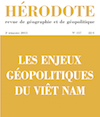Les Relations ambivalentes entre l’État-parti vietnamien et les Vietnamiens de l’étranger
par Pierre Journoud
Replacés au cœur d’enjeux économiques et géopolitiques majeurs depuis le tournant du Doi Moi, les 4 millions de Viêt kiêu (Vietnamiens de l’étranger) sont de plus en plus courtisés par le Parti communiste vietnamien, y compris les « traîtres » d’hier, liés à l’ancien régime de Saigon. Le temps, mais aussi et surtout les exigences du développement économique et du bien-être ont favorisé l’apaisement des mémoires et le rapprochement entre les anciens adversaires, que la résurgence des tensions entre le Viêt Nam et la Chine semble, au moins en apparence, achever de cimenter. Toutes les ambiguïtés, en réalité, ne sont pas dissipées. La commune perception d’une menace chinoise alimente, certes, un nationalisme transnational porté à transcender les vieux clivages issus des guerres du XXe siècle. Mais, sous l’effet d’une active et ingénieuse cyberdissidence, elle réactive aussi la critique de l’État-parti, jugé corrompu et trop faible vis-à-vis de la Chine. Victime de ses propres divisions mais soucieux de préserver avant tout la stabilité du pays, l’Étatparti oscille entre le développement de son arsenal répressif et l’approfondissement continu de ses liens avec les Viêt kiêu.
Abstract : The Ambivalent Relationship Between the Vietnamese State-Party and Overseas Vietnamese
Once more the focus of major geopolitical and economic challenges since the Doi Moi turning point, the four million Viêt kiêu (Overseas Vietnamese) are of growing interest to the Communist Party of Vietnam, including the former “traitors” of the Republic of South Vietnam. The passing of time as well as the growing economic and social needs in Vietnam have helped bitter memories to fade and encouraged rapprochement between former enemies, and which appears to have been made stronger by the renewal of Sino-Vietnamese tensions. Not all ambiguities have disappeared, in reality. The common perception of a Chinese threat is fueling a transnational nationalism, capable of overcoming the old rifts provoked by wars of the XXth century. Under the effect of active and ingenious cyber-dissidents, it is reviving, however, criticisms of the Vietnamese StateParty, which is accused of being too corrupted and weak vis-à-vis China. Suffering from its own divisions but concerned about the stability of the country above all, the StateParty wavers between the development of its repressive arsenal and the continued deepening of its links with the Viêt kiêu.
Tweeter cet article Suivre @RevueHerodote sur Twitter









